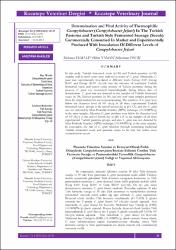Determination and Vital Activity of Thermophilic Campylobacter (Campylbacter Jejuni) in the Turkish Pastırma and Turkish Style Fermented Sausage (Sucuk) Commercially Consumed in Market and Experimentally Produced With Inoculation of Different Levels of Campylobacter Jejuni
Özet
In this study, Turkish fermented sucuk (n=30) and Turkish pastırma (n=30)
samples sold in retail stores were analyzed in terms of C. jejuni. Afterwards, C.
jejuni was experimentally inoculated at different levels (Group I:102, Group
II:104, and Group III:106 cfu/ml) into the mixtures of traditional Turkish
fermented sucuk and çemen (spice mixture of Turkish pastırma) during the
process. C. jejuni was monitored bacteriologically during fifteen days of
fermentation. C. jejuni was not detected in the samples of Turkish fermented
sucuk (n: 30), Turkish pastırma (n: 30), and raw beef meat samples purchased
from the retail markets for use in manufacturing. The numbers of C. jejuni were
below the detection level of 102 cfu/g in all three experimental Turkish
fermented sucuk groups at the end of second day at pH 5.32, and also C. jejuni
was not detected by Most Probable Number (MPN) technique (<0.30MPN/g)
in the same samples. Likewise, C. jejuni numbers were below the detection level
of 102 cfu/g at the end of fourth day at pH 5.19 in the samples of all three
experimental Turkish pastırma groups, and also C. jejuni was not detected by
Most Probable Number (MPN) technique (<0.30MPN/g) in the same samples.
In conclusion, the risk of C. jejuni infection through consuming traditional
Turkish fermented sucuk and pastırma seems to be very low unless cross
contamination occurs. Bu araştırmada, piyasada tüketime sunulan 30 adet Türk fermente
sucuğu ve 30 adet Türk pastırması C. jejuni bakımından analiz edildi. Takiben,
üretim aşamasında geleneksel Türk fermente sucuğunun hamuruna ve Türk
pastırmasının çemenine C. jejuni deneysel olarak farklı gruplarda inoküle edildi.
(Grup I:102, Grup II:104, ve Grup III:106 kob/ml). On beş gün süren
fermentasyon süresince C. jejuni düzeyi incelendi. Piyasadan toplanan 30 adet
Türk fermente sucuğu ve 30 adet Türk pastırması ve marketlerden üretimde
kullanılmak amacıyla temin edilen çiğ sığır etlerinde C. jejuni saptanmadı.
Deneysel olarak üretilen Türk fermente sucuklarında pH 5.32’de 2. günün
sonunda her 3 grupta C. jejuni düzeyi 102 cfu/g’ın altında saptandı. Aynı
örneklerde, C. jejuni düzeyi En Kuvvetle Muhtemel Sayı Tekniği ile (EMS)
(<0.30MPN/g) olarak saptandı. Benzer biçimde, deneysel olarak üretilen Türk
pastırmalarında C. jejuni düzeyi her 3 grupta 4. günün sonunda pH 5.19’da 102
cfu/g’in altında saptandı. Aynı örneklerde C. jejuni düzeyi En Kuvvetle
Muhtemel Sayı Tekniği ile (EMS) (<0.30MPN/g) olarak saptandı. Sonuç olarak,
C. jejuni infeksiyonunun çapraz kontaminasyonlar olmadığı sürece Türk
fermente sucuğu ve Türk pastırmasında çok düşük düzeyde risk yaratabileceği
sonucuna varıldı.
Cilt
6Sayı
2Bağlantı
http://hdl.handle.net/11630/2341Koleksiyonlar
- Cilt 6 : Sayı 2 [8]



















